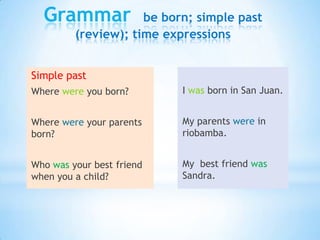Ingles 5th
- 2. Growing up In Unit 5, you learn how to….. * Use the simple past in statement and questions (review) * Use time expressions to talk about the past * Use all, most, a lot of, a feu, etc. * Talk about memories of childhood, school, and your teenage years. * Correct yourself with expressions like wait, actually, and i mean.
- 3. Grammar be born; simple past (review); time expressions Simple past Where were you born? I was born in San Juan. Where were your parents born? My parents were in riobamba. Who was your best friend when you a child? My best friend was Sandra.
- 4. Simple past tence joel + joel wrote interesting reports. - He didn’t write interesting reports. ? Did he write interesting reports? Yes, he he wrote interesting reports. Yes, he did. No, He didn’t write interesting reports. No, he didn’t
- 5. Information questions Simple past tence + joel wrote interesting reports. - He didn’t write interesting reports. ? Did he write interesting reports? Yes, he wrote interesting reports. Information questions exception Hwo wrote reports? interesting * Joel always goes this way Yes, he did. No, He didn’t write interesting reports. What No, he didn’t *interesting reports did he write ?
- 6. Information questions What time did the music concert begin yesterday? At 10 o’clock v.s How long did they spead in the beach? Two days v.s Hwo drove my car last night? My brother v.p
- 7. Grammar 100% Todos All All of 80% - 90% La mayoría Most Most of 90% - 60% Algunos Some Some of 35% - 25% Unos pocos A few A few of 0% Ninguno No None of muchos A lot of A lot of
- 8. Example All people boil yours clothes. All of the people in my city boil yours clothes. All of them boil yours clothes. Most axen eat medic. Most of the axen in my town eat medic. Most of us eat medic. Some women wear dress. Some of the women in my family wear dress Some of us wear dress A few of men in my class share ideas. A few of men in my class share ideas A few of them share ideas No feet be barefoot. None of feet in my city be barefoot None of them be barefoot
- 9. Correcting things you say Wait: to correct a word. I mean: to correct a complete information. * Who took you to school on your first day? My mom. No, wait, my dad took me. * Where do they take three accounting seminaries this mont? At the school. No, wait at the university ÔÉò What is your name, Alulema. I mean yolanda.
- 10. * THANK YOU FOR THEIR ATTENTION GOOD TO THOSE THAT PAID ATTENTION










